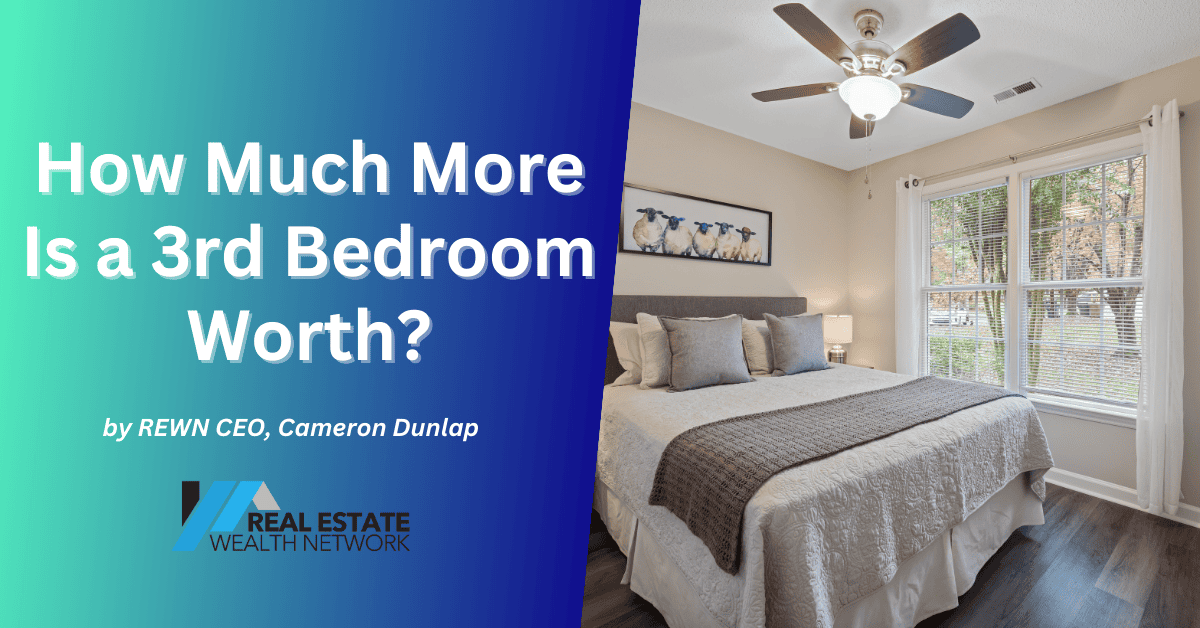
Cam Dunlap here, with an interesting question that was asked during a recent coaching call. I’m paraphrasing for clarity:
You found a property that could be a good deal: 3-bedroom, 2-bath, 1-car garage. The best nearby comps: similar square footage & amenities, but they’re both 2-bedroom houses. What percentage more is this 3-bedroom house worth?
Obviously the property is worth more because it has that 3rd bedroom.
But how much more?
Well, it depends.
Sorry, not the awesomest answer, I know.
See, it depends on where the house is… and that’s such a broad variable that there isn’t even a narrow set of rails where you could just say, “Just add $10 grand.”
Because while that might work in a market like Syracuse, New York… in Bethesda, Maryland, San Diego, or most other markets, that 3rd bedroom could be worth $100 grand more.
So how do you know?
There is no percentage to just mark it up by 10% or 15%. I mean, you could do that, and through your own process of learning a specific market and by process of elimination, you might come up with some formula to use right there in that market ONLY, but that only comes when you learn by doing.
But remember, the offer you make in Duluth, Minnesota, won’t apply to Lubbock, Texas
So again, how do you know how much more that bedroom is worth?
Call a local appraiser and ask — but you have to frame it in a certain way, because they’re not going to be willing to do an appraisal without you paying for it.
“Hey, I’m a local investor, and I don’t need an appraisal on this house today. I may in the future, and there’s certainly other houses I may need it for in the future, but I just have a quick question, and I’m hoping you’d be willing to help me. It’ll only take a second, I hope. How much more is a 3rd bedroom worth in the Merlin Park subdivision? My best comps are 2 bedrooms. This one’s a 3-bedroom. Clearly, it’s worth more. Can you give me an idea what that bedroom’s worth in that neighborhood in today’s market?”
In my experience, the appraiser will give you an answer. If they say you have to pay $500 for an appraisal, then you clearly know which appraiser you will never do business with.
Oh, also, did you notice how specific I was about where the house is? That’s important because the area matters. Give the appraiser the address… you’ve got nothing to lose. They’re not your competition.
Anyway, the appraiser will probably say something like, “You’re looking at about $30 to $40 grand, maybe a tiny bit more, in that neighborhood, if the house is in bank financeable, move-in condition.
Now, I’m immediately going to latch on to $40k. I’m always going to take the higher number.
Why would the appraiser be willing to help?
Well, because it takes them 2 seconds.
They’ve positioned themselves as a local knowledgeable expert in your eyes and in the future when you do need an appraisal, you’ll go back to them. Or when someone you know needs an appraisal, you’ll send them to that appraiser. Good will in 2 words.
To try and guess, well, is just a guess. To come up with a percentage is OK-ish, but understand it’s a moving target. As prices go up, that’s going to change it. If prices go down, that’s going to change it.
When it comes to pricing and valuation, we also have to be super careful of something we all have: confirmation bias.
It looks something like this: “That bedroom was worth $40,000 last year, so it’s worth $40,000 now.”
What that did was confirm what we already knew from what we’ve learned in the past and we’re now biased by.
That’s fine, because what we learn in the past, we can carry forward so long as we’re careful not to apply it in an environment that has changed or is different just because it’s easy.
Now, it’s up to you to go find deals and make smart offers.
Regards,
Cam Dunlap